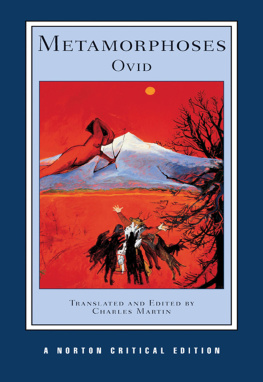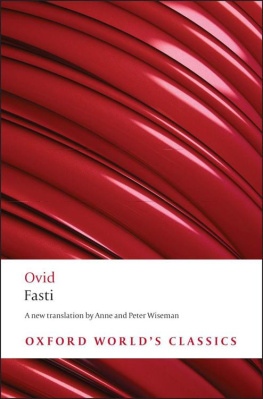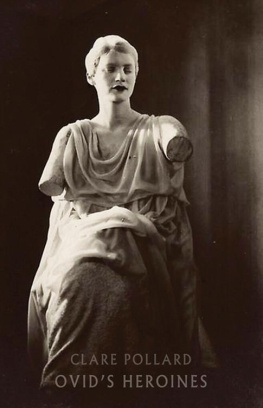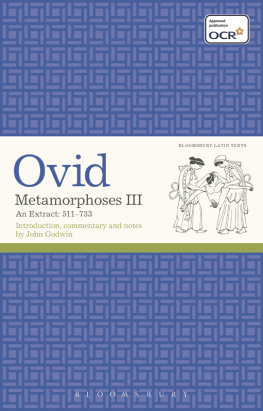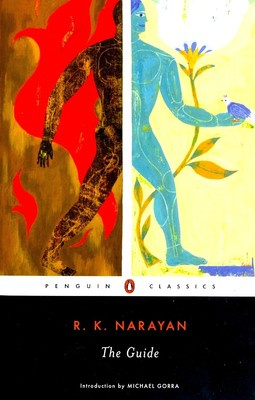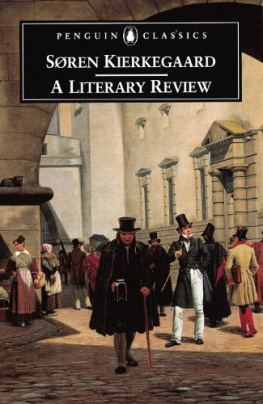PUBLIUS OVIDIUS NASO was born in 43 BC at Sulmo (Sulmona) in central Italy and educated at Rome, where his studies were concentrated in the law and rhetoric. While such a background prepared him for a public career, he also devoted himself to poetry. His first published work was Amores, a collection of short love poems; this was followed by Heroides, verse-letters, Ars Amatoria, a handbook on love, Remedia Amoris and Metamorphoses. By about AD 8 he had become a prominent literary figure in Rome. However, in the same year he was banished to Tomis, on the Black Sea. It is generally thought that the reasons for his exile include the contents of the Ars Amatoria, which greatly angered Augustus. He continued to write, notably Tristia and Epistulae ex Ponto, and always spoke longingly of Rome. He died, still in exile, in AD 17.
HAROLD ISBELL graduated from Loras College, Iowa, in 1959. He took his MA in 1962 at the University of Notre Dame, later joining the universitys faculty in the Program of Liberal Studies. Prior to 1972 he was Writer in Residence, Director of the Writing Program, and most recently held the position of Associate Professor of English at St Marys College at Notre Dame. From 1972 until 1983 he was an officer and a director of the Continental Bank and Trust Company in Salt Lake City. Over the years he has served on the boards of directors of one school, two ballet companies and a publishing house. At present he is retired and living in San Francisco, California. His poems, reviews and essays have been published in various places, and he is also the editor and translator of The Last Poets of Imperial Rome, which has appeared in Penguin Classics.
Heroides
Translated with Introductions and Notes by
HAROLD ISBELL
PENGUIN BOOKS
PENGUIN BOOKS
Published by the Penguin Group
Penguin Books Ltd, 80 Strand, London WC2R 0RL, England
Penguin Group (USA) Inc., 375 Hudson Street, New York, New York 10014, USA
Penguin Books Australia Ltd, 250 Camberwell Road, Camberwell, Victoria 3124, Australia
Penguin Books Canada Ltd, 10 Alcorn Avenue, Toronto, Ontario, Canada M4V 3B2
Penguin Books India (P) Ltd, II Community Centre, Panchsheel Park, New Delhi 110 017, India
Penguin Group (NZ), cnr Airborne and Rosedale Roads, Albany, Auckland 1310, New Zealand
Penguin Books (South Africa) (Pty) Ltd, 24 Sturdee Avenue, Rosebank 2196, South Africa
Penguin Books Ltd, Registered Offices: 80 Strand, London WC2R 0RL, England
www.penguin.com
First published 1990
Reprinted with a new Chronology, Further Reading and corrections 2004
14
Translation, Introductions, Further Reading and Notes
copyright Harold Isbell, 1990, 2004
All rights reserved
Except in the United States of America, this book is sold subject
to the condition that it shall not, by way of trade or otherwise, be lent,
re-sold, hired out, or otherwise circulated without the publishers
prior consent in any form of binding or cover other than that in
which it is published and without a similar condition including this
condition being imposed on the subsequent purchaser
EISBN-13: 9780141913094
Contents

Introduction

Publius Ovidius Naso was born in 43 BC, and died in AD 17. He was educated in Rome where his studies were concentrated in the law and rhetoric. While such a background prepared him for a public career he also devoted himself to poetry. By about AD 8, he had become a prominent literary figure in Rome. That year he was banished to Tomis, a dismal provincial town on the Black Sea. The reasons for the exile are thought to be twofold, with general agreement that the contents of the Ars Amatoria as well as some other unspecified fault had greatly angered Augustus.
Ovid was a prolific writer who produced a number of long works that were widely read in his own day and in the centuries after his death. He devoted much of his poetic career to the subject of love and its effects. It is evident that Ovid sought immortal fame by abandoning the epic style of Virgil and devoting himself to a celebration of human experience. In all his works he explores human emotion, its causes and effects. Though writing in the period following the great achievements of Virgil and Horace, Ovid displayed a level of competence that is in no way diminished by comparison with the competence and accomplishment of his forebears. He did not follow in the footsteps of his immediate precedessors except to demonstrate his own richly independent genius. It should be noted that any attempt to establish a chronology of composition for the extant works of Ovid is certain to be frustrated. Though a consensus seems to have arisen among scholars, any evidence is necessarily fragmentary and too often inconclusive. For the most part it is possible to place various works sequentially in the chronology but at many points the placement becomes a matter of conjecture.
If it can be said that the Heroides as a unified work has a common subject matter, it is very simply the tension that exists between what is desired and what is possible within the context of love and erotic desire. Though this tension between what is wanted and what can actually be achieved is in every case doomed to be frustrated, each letter defines and describes the amorous experience in terms that are unique to the circumstances of its writer.
It is significant for an understanding of this work that one should be attentive to the narrative style. A narrator writing in the first person or epistolary style is necessarily confined; the narrative flows out of an individual experience with all its sensory and imaginative limitations. The progress of each letter, then, necessarily moves in ways that indicate the state of mind of the fictive character writing it. In every case the letter is the product of a mind which has come to some critical juncture. As the letter develops out of the uncertainty, even the terror, of crisis we perceive the minds expression as reflecting the minds distracted condition. While such a notion may seem a commonplace observation, it is essential to any understanding of Ovids accomplishment.
Very simply put, Ovid is not so much telling a story as he is fleshing out the bare bones of another authors minor character to reveal a depth and profundity of personality not inconsistent with the character we already know from other reading. The subject of Ovids sources can be confusing and complex in the extreme. One consideration, however, is important. In selecting the materials to be used Ovid ranged widely through the works available in his day. As well as a deep knowledge of Homer, he also shows a great familiarity with Greek and Roman drama and literature. Ovid has always been famous for his ability to use and manipulate mythological material, and he also displays a working knowledge of geography and astronomy. Clearly Ovid was a man of substantial learning who was able to adapt this to serve the task at hand.
Throughout the work there is a recurring concern with obligations and duties. But it is only seldom that any of Ovids characters find themselves torn between their obvious obligation to an existing contract of marriage and their desire for immediate gratification. The resolution of such a conflict takes a variety of forms but they are all, for the most part, rationalizations which insist that the ardour of passion has created its own obligation or necessity which now must be honoured. In the hands of these characters stability becomes a movable thing indeed. There is a recurring motif of legalism through many of the letters. There is talk of lawyers and suits, of what is owed and what is expected. Where the usual understanding of marriage has been that of a binding contract publicly executed before witnesses, there is now a strong attempt to apply the same form to desire and infatuation.



